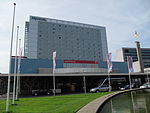Europol
1998 establishments in the Netherlands1998 in the European UnionAgencies of the European UnionCriminal investigationEuropol ... and 3 more
Government agencies established in 1998Intelligence agenciesOrganisations based in The Hague

The European Union Agency for Law Enforcement Cooperation, better known under the name Europol, formerly the European Police Office and Europol Drugs Unit, is the law enforcement agency of the European Union (EU) formed in 1998 to handle criminal intelligence and combat serious international organised crime and terrorism through cooperation between competent authorities of EU member states. The Agency has no executive powers, and its officials are not entitled to arrest suspects or act without prior approval from competent authorities in the member states. Seated in The Hague, it had 1,432 staff members in 2022.
Excerpt from the Wikipedia article Europol (License: CC BY-SA 3.0, Authors, Images).Europol
Eisenhowerlaan, The Hague Scheveningen
Geographical coordinates (GPS) Address Phone number Website External links Nearby Places Show on map
Geographical coordinates (GPS)
| Latitude | Longitude |
|---|---|
| N 52.0928 ° | E 4.2815 ° |
Address
Europol
Eisenhowerlaan 73
2517 KK The Hague, Scheveningen
South Holland, Netherlands
Open on Google Maps







